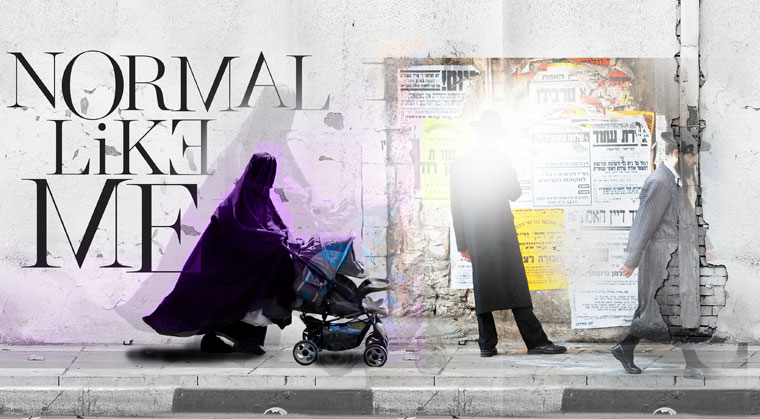Normal Like Me: Chapter 58


Tuesday, 12 Av 5775
At five in the morning, Jerusalem was in a deep sleep. The early risers treaded lightly on their way to shul, careful not to wake their beautiful city.
Tzadok shot out of bed. A great, resounding shofar was calling him. From his window he beheld Jerusalem glowing in the first light of dawn, venerable as only a three-thousand-year-old city can be. The shofar called to him again.
“Ben adam, sim panecha el Yerushalayim,” the voice pounded within him, sharp and bright. Only the truth could sound so clear. Quickly, he slipped on his white robe. Thirty years ago, on Tishah B’Av, his soul had been thrown down to this world of sheker… this world of chaos and confusion.
But he heard the voices, clear and sharp as violin notes rising from the silent streets below. Nothing could be more real, more true. They were his, those thousands of voices bursting from the heavens. “V’hinabei el kerem Yisrael,” they commanded.
Jerusalem slowly woke up to a new morning, and Tzadok sang in her streets. “Ashirah na liyedidi,” he sang, and walked, and sang, “Shirat dodi l’karmo.” They were starting to follow him… men, women, and children of all ages, from all generations. They were all waiting, brimming with hope and anticipation. It was up to him; the yoke was on his shoulders.
By the time he reached Davidka Square, Rechov Yafo was so full that the masses of people following him had to squeeze to the sides to make way for the first trains hurrying from the depot to Mount Herzl. The trains would be back soon, Tzadok knew, returning with even more people eager to celebrate with him.
In the little apartment on Rechov Shivtei Yisrael, Miriam woke up and looked at the little basket on the nightstand, full of Tzadok’s medications. “Full of lies,” he claimed. “They want to make my world dark. Is that what you want, Miriam? You want everything to go dark?”
She didn’t even sigh. She’d used up all her sighs. And anyway, what did it matter to her, as long as her wallet was full and he wasn’t harming anyone?
She looked next at the hook. No white robe. The shelf above it — no darbouka. No shofar either. Somehow a thin sigh escaped from the place inside her that she’d thought had no sighs left. She heard whimpering from the children’s room. But her wallet was full. When Tzadok went downtown, he always came back with money. And not just small change. Maybe she’d go shopping for school supplies today, and pleated skirts for Esther, who was starting first grade in a few weeks. The children wanted new pencil cases, and those fancy sharpeners, and it added up to a big expense. While Tzadok was hospitalized, she’d been afraid of poverty. But now he was bringing home money again.
While Miriam prepared breakfast for the children and thought about the schoolbooks she would buy them, Tzadok marched along Rechov Yafo with the swelling crowd behind him, their voices joined in the song of the vineyard. They filled the whole street, and the early risers looked at the crowd and smiled with infinite yearning at the lone prophet, singing softly to himself on Rechov Yafo.
“Ki kerem Hashem Tzevakot Beit Yisrael, v’ish Yehudah nata sha’ashu’av…”
At eight in the morning, Tzadok was trailing his way down Rechov Agrippas. The sun was already beating down, and he stopped to buy himself a slushie. Even a prophet could use a cold drink on such a hot day. Wandering down the narrow alleys of Nachlaot toward Gan Sacher, he sipped the sweet crystals through a straw. Hmm, he thought, as the rolling lawns brought back memories, maybe he ought to get those boys back together and start giving darbouka lessons again. He had all their phone numbers… he would call them.
Sweat poured down his forehead as he slowly climbed the path to Sderot Rabin. At a quarter past eight, the security guards at the Supreme Court building were surprised to see a figure in a white robe blowing a shofar in the entry plaza. In half a second one of them was standing in front of him. “No propaganda allowed here, sir.”
“Vayekav l’mishpat v’hineh mispach,” Tzadok replied serenely, measuring the space with his eyes. The guard was armed. Tzadok looked at the submachine gun and was convinced for the moment.
“Demonstrations and propaganda are allowed only at Kikar Agranat — not here.”
“But that’s far from here.”
“Right. That’s exactly the point.”
Tzadok slowly turned to go. And in those split seconds he took a mental picture of the building, the entry passage, the haughty portico, and the security-check area.
He would be back. He would return to uproot this wickedness from Jerusalem.
(Excerpted from Mishpacha, Issue 724)
Oops! We could not locate your form.



